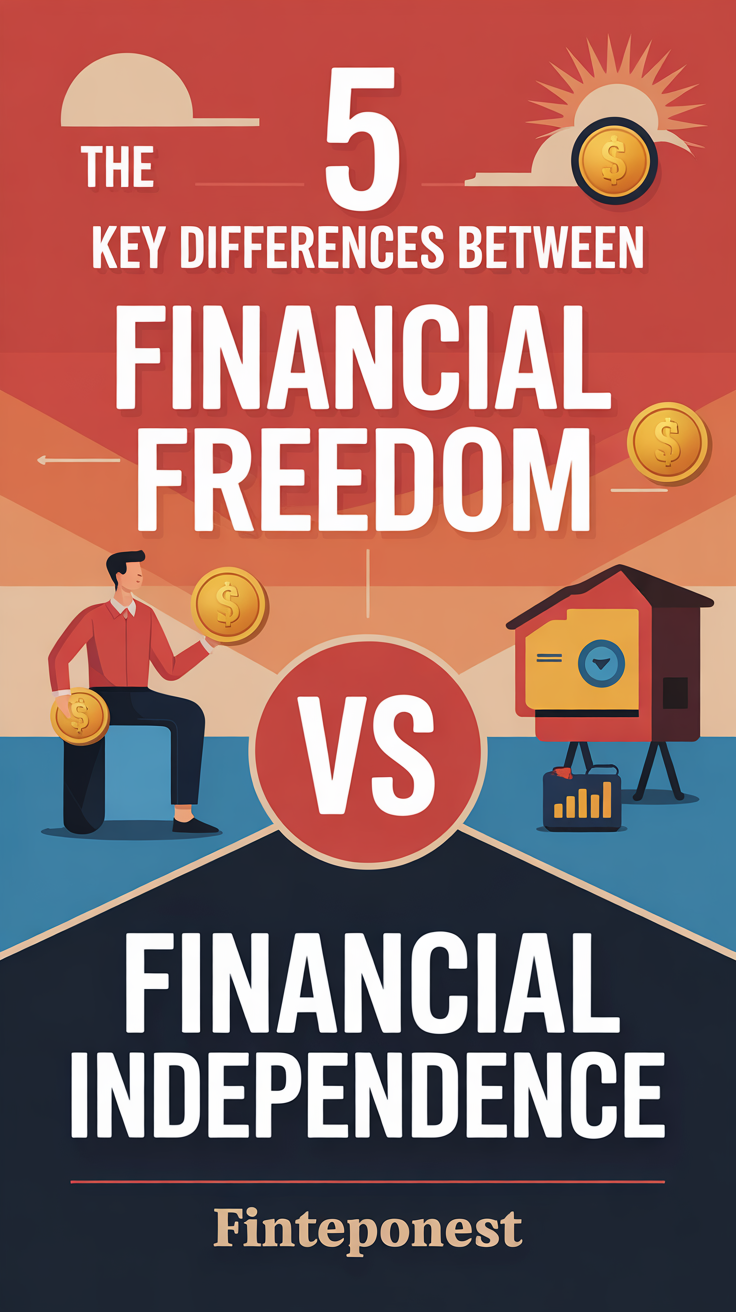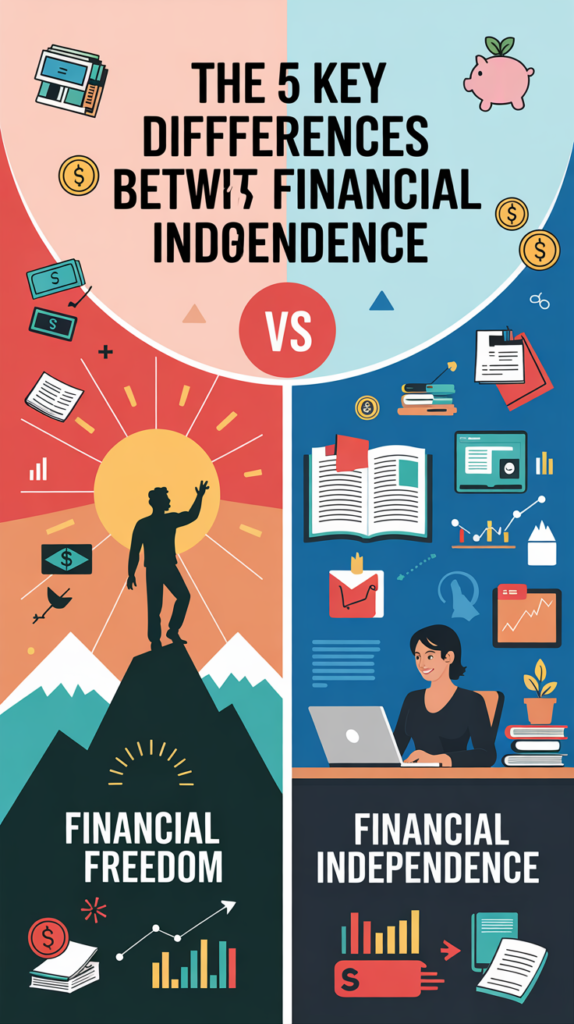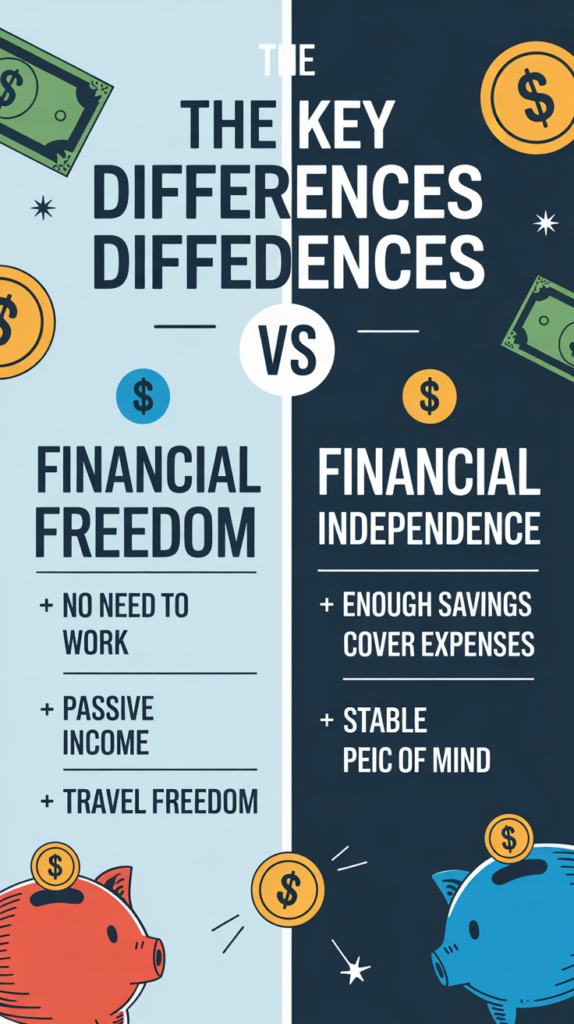Physical Address
304 North Cardinal St.
Dorchester Center, MA 02124
Physical Address
304 North Cardinal St.
Dorchester Center, MA 02124

Achieving financial stability is a universal goal for many people, but the terms financial freedom and financial independence are often used interchangeably, even though they refer to two distinct concepts. If you’re on the path to improving your finances, it’s essential to understand the difference between these two terms to ensure that you are working toward the right financial goals
In this article, we will explore the five key differences between Financial Freedom vs Financial Independence. Whether you’re just starting your journey or are already well on your way, understanding these differences can help you make more informed financial decisions. Let’s dive in!

Financial freedom refers to a state where your income from investments, passive sources, or business ventures exceeds your living expenses, allowing you to live your life without worrying about money. It is a broader term that encompasses not just the ability to sustain yourself but to live a life of your choosing, free from financial constraints.
Achieving financial freedom means having enough resources to do what you want without being limited by a paycheck or salary. You can choose to work less, take vacations, pursue your passions, or spend more time with loved ones. Financial freedom is about having options — and most importantly, control over how you spend your time and money.
On the other hand, financial independence specifically refers to the ability to cover your living expenses without relying on earned income (e.g., salary or wages). It’s often associated with the idea of no longer needing to work for money. People who are financially independent have enough wealth accumulated, usually through investments, that they can live comfortably without needing a traditional job.
In simple terms, financial independence is the point where your wealth can generate enough income to cover your day-to-day living expenses, making you “free” from the obligation to work for money.
Achieving financial freedom requires diversifying your sources of income. This may include investments in stocks, bonds, real estate, or businesses that generate passive income streams. For example, dividends from stocks, rental income from real estate, or profits from a side business could contribute to your financial freedom.
The goal is to develop multiple streams of income that work for you, reducing your dependence on any single source. These income streams allow you the freedom to live life on your terms, as they don’t require constant active participation.
Financial independence, on the other hand, is more focused on accumulating enough capital through investments or savings so that these resources can sustain you without requiring you to work. Financial independence might come from sources like rental properties, investment returns, or pensions.
For many, the goal is to have enough investments or assets that the returns on these investments cover all living expenses, effectively replacing the need for earned income. While financial independence can certainly contribute to financial freedom, it is more about building up wealth to the point where work is no longer necessary.
Financial freedom allows you to redefine your relationship with work. With enough passive income streams, you may choose to reduce your working hours, pursue a passion project, or take sabbaticals. Financial freedom is about having the power to choose when, how, and whether you work.
While it’s still possible to have a job while striving for financial freedom, the goal is not to rely on the paycheck but to free up time for other pursuits. You can even choose to stop working entirely if you feel that you’ve reached a comfortable level of income to cover your desired lifestyle.
Achieving financial independence typically requires a more traditional approach — working hard, saving, and investing until you have enough assets to provide for you indefinitely. Many people working toward financial independence put in years of effort, saving aggressively, and focusing on high-return investment strategies, before they can enjoy the fruits of their labor.
Once financial independence is achieved, however, you might not need to work at all. The emphasis on financial independence is on accumulating enough capital so that your wealth works for you without requiring active employment.
A major aspect of financial freedom is the ability to live a life of your choosing. It gives you the flexibility to pursue personal interests, hobbies, travel, or simply spend more time doing what you love without worrying about how much you are earning. Financial freedom doesn’t necessarily mean you have to stop working altogether; rather, it offers the option to scale back and live life on your terms.
For instance, someone who has achieved financial freedom might choose to work part-time or take extended vacations without the fear of running out of money. It’s about the power of choice and having the ability to prioritize your well-being and happiness over financial concerns.
While financial independence can also offer a greater degree of freedom, it is usually less flexible than financial freedom in terms of lifestyle. Financial independence often means living within your means based on your wealth. If you have enough to cover your living expenses indefinitely, you may opt to live a modest or frugal lifestyle to preserve your wealth and ensure long-term sustainability.
People who are financially independent may still have the option to work or engage in hobbies, but they might choose to do so because they enjoy it rather than out of necessity. Financial independence provides the foundation to make those choices, but the lifestyle aspect of financial freedom is generally more expansive.
The timeline for achieving financial freedom can vary depending on your approach and financial goals. Some people might achieve financial freedom in a relatively short amount of time by focusing on high-growth investments or successful entrepreneurial ventures. Others may take longer, especially if they are more conservative in their financial strategy.
The effort involved in reaching financial freedom depends on the level of income you need to generate, your lifestyle choices, and the amount of time you’re willing to dedicate to learning about personal finance and investment strategies. Financial freedom is often seen as a more gradual process that may require years of building multiple income streams.
Financial independence typically requires a more focused and disciplined approach, as it demands the accumulation of substantial wealth. Many people working toward financial independence follow the “FIRE” (Financial Independence, Retire Early) movement, which involves intense saving and investing over a period of years. Reaching financial independence may take decades depending on your current financial situation, income level, and ability to save.
While it requires significant effort upfront, achieving financial independence means that once you’ve hit your target, you no longer need to work, and the returns from your investments sustain your lifestyle. However, this doesn’t mean you can simply relax; you’ll still need to manage your investments and make smart decisions to ensure long-term sustainability.

Join 2800+ VIP Members In The Most Profitable Crypto Community Today!
While the terms financial freedom and financial independence are often used interchangeably, they represent different financial goals. Financial freedom is about having the flexibility and options to live your life without worrying about money, whereas financial independence is specifically about having enough assets to cover your expenses without the need to work.
Both financial freedom and financial independence are worthwhile goals, but they require different strategies and timelines. Financial freedom tends to emphasize the ability to choose how you spend your time, while financial independence focuses more on accumulating the wealth needed to eliminate reliance on earned income.
Understanding the key differences between these two concepts can help you define your financial goals more clearly and create a plan to achieve them. Whether you’re aiming for financial freedom or financial independence, both offer valuable opportunities to live life on your terms.
Start today by evaluating where you stand financially and setting realistic goals that align with your dreams for the future. With the right approach, you can achieve both financial independence and freedom — it’s all about making the right choices at the right time!
